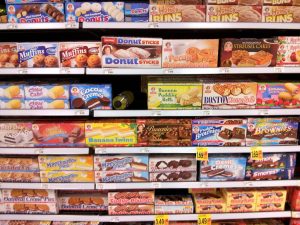“Precision fermentation”, a technique in which microbes are used to produce edible substances, more or less in the same manner as beer, is a term you may already have heard. And if you haven’t, you’re going to:precision fermentation is being loudly hailed as not just the future of food but the salvation of the planet. All hail the new messiah!
According to Joel Scott-Halkes, a “rewilding activist” and vegan advocate from the UK, “a vegan diet could spare 3/4s of today’s farmland for rewilding, but with precision fermentation (PF) we can go even further. PF can now produce palm oil, coffee and chocolate, meaning many of our most damaged tropical habitats could also be restored.”
George Monbiot has made precision fermentation central to his new book Regenesis, in which he argues that mankind must abandon all forms of traditional agriculture, both plant and animal, if we wish to survive the Climate Crisis. In Monbiot’s world without traditional crops and livestock, only large-scale precision fermentation can produce enough food to feed a global population expected to reach 10 billion by 2050.
Never mind that George was once a sworn opponent of the growing corporatisation of everyday life; now, it seems, we must hand over all control of our diets to corporations, since they will produce, and own by means of patents, all precision-fermented products and the technologies used to make them.

George Monbiot in 2013 (John Russle / Flickr)
I’ve already written at length, especially in my new book The Eggs Benedict Option, about how the planned transition to a new global plant-based diet, supplemented with novel proteins, will lead to the total corporate capture of the food supply, a process which is already extremely well advanced as things currently stand. What I really want to talk about here is why some of us believe we can perfectly replicate natural whole foods with processes like precision fermentation. (Spoiler: We can’t.)
This attitude is an example, I would suggest, of what the great traditionalist thinker Rene Guenon called “the reign of quantity”. Our materialist age has replaced a proper understanding of the “quality” of things – their full context, significance, properties and purpose – with a base understanding of things simply in terms of their “quantity” – literally, numbers and units. Guenon saw this as the source of our civilisational malaise and tied it to ancient conceptions of cyclical history, something we don’t need to get into here. What matters is the idea that we have substituted a proper “deep” conception of things for one that is shallow and amenable only to quantification.
“It’s also not a wonder that consumers love processed food. It’s cheap and addictive by design – “hyperpalatable” is the jargon term”
In the present case, then, instead of understanding food as the product of unique natural and cultural processes that take place in very particular places and at very particular times, we have come to see food simply as a narrow series of properties that can be quantified and then, with the right technology, replicated by scientists and corporations. And what that really means is breaking food down into its constituent macronutrients: protein, fat, carbohydrates.
So when somebody like Joel Scott-Halkes says precision fermentation can actually produce coffee, he’s saying that precision fermentation can produce a product that has a similar macronutrient profile to coffee, contains some other essential substances like caffeine, and has a similar taste and other properties like being able to dissolve in hot water. Whatever this new substance is, it’s not actually coffee. Most people can intuit this – and they’re right – but it’s easy, as events of the last three years have shown, for most people to be gaslit and made to doubt their intuitions by spectacled nerds in labcoats and the spectacled nerds who tout their research on social media.

Graduate-level Food Science students at the University of Arkansas (Flickr)
The idea that the proper way to think of food is in terms of its protein, fat and carbohydrate content, was first popularised just over a century ago by the Fanny Farmer 1896 Cook Book. Before then, it would have been simply unthinkable for an ordinary person to consider their food primarily in terms of its chemical components. A wild fish like a mackerel or sardine was not “an excellent source of protein and fat”, any more than oats were “an excellent source of carbohydrates”. These were simply whole foods that were eaten and appreciated for their qualities in the eating, or even just because they were readily available and affordable.
As Catherine Shanahan, author of the excellent book Deep Nutrition, notes, one of the principal effects of this new chemical focus has been to draw our attention away from what really matters when it comes to food: its source.
“And that, by the way, is exactly how the mass producers of cheaply manufactured processed food products would have it. Now, we can say things like, ‘Sweet potatoes are really nutritious!’ without stopping to consider that some sweet potatoes – those grown in sterile, toxic soil – are nutritionally bereft. We can toss another package of farmed salmon into our shopping cart thinking that it’s essentially the same, nutritionally, as wild, And we can buy beef from cows raised on petrochemical-soaked corn, in deplorably crowded conditions, and tell ourselves that, as long as it’s tender, it’s every bit as good for us as the flesh from happy, roaming, grass-fed animals.”
Many of us think, then, that simply hitting our recommended daily allowances, the calorie and macronutrient targets set for us by the powers-that-be, makes us healthy, regardless of where those calories and macronutrients come from. This has many absurd manifestations, not least of all in the would-be bodybuilder who thinks that eating massive quantities of lean chicken and rice, cooked with a low-calorie oil spray, is a recipe for health and vitality, and the vegan, who is convinced that plant-source proteins are interchangeable with animal-source proteins, without attention to the fact that plant foods generally lack certain key amino acids and contain compounds (“anti-nutrients”) that prevent absorption of protein – not to mention the fact that there’sa wide variety of essential nutrients, including cholesterol, creatine and vitamin b12, that you just can’t get from chickpeas, however many you might choose to eat.

Junk food aisle at a grocery store in Houston Texas in 2012 (Cory Doctorow)
Perhaps the ultimate food for today’s reign of quantity is processed food, an endlessly modular series of products constructed from a small number of inexpensive ingredients, like corn and soy meal, refined wheat, partially hydrogenated vegetable oil, meat and protein meal. All you have to do is take more of one ingredient and less of another, and add a few different flavourings, texturisers and colourings, and instead of dog kibble you’ve got a pack of Cheerios or a mac-and-cheese ready meal. It’s not a wonder corporations love processed food: quality doesn’t even figure.
“Consumption of processed food is linked to every imaginable ailment, from obesity and diabetes, to cancer and even autism.”
It’s also not a wonder that consumers love processed food. It’s cheap and addictive by design – “hyperpalatable” is the jargon term. Armies of scientists are employed by junk food manufacturers to tweak ingredient ratios and additives in order to ensure consumers reach the so-called “bliss point”, when the food is maximally satisfying and as easy as possible to eat. Studies have shown that consumption of processed food actually rewires the brain – permanently – in the same manner as a drug addict.
And so our hunger for processed food only grows. The average child between the ages of two and five in the UK now derives two-thirds of their daily calorie intake from processed food, making their diet probably the worst in the world among their cohort, with American and Australian children not far behind. Consumption of processed food is linked to every imaginable ailment, from obesity and diabetes, to cancer and even autism.
The belief that we can simply replace beloved real foods with precision-fermented alternatives – or alternatives produced in any other way, like “plant-based meat” – is just more of the same deluded thinking that has made us sicker, unhappier and more dependent than our ancestors could ever have imagined possible. We have lost sight of what food is and should be. Only by paying attention once more to quality – to the true nature of real food –can we hope to escape this miserable reign of quantity.
This op-ed features opinion and analysis from Raw Egg Nationalist, the popular health and fitness author recently profiled in the Tucker Carlson Originals documentary, “The End of Men“. His book, The Eggs Benedict Option, is available on his website and from popular book sellers. His magazine, Man’s World, is available online.




































